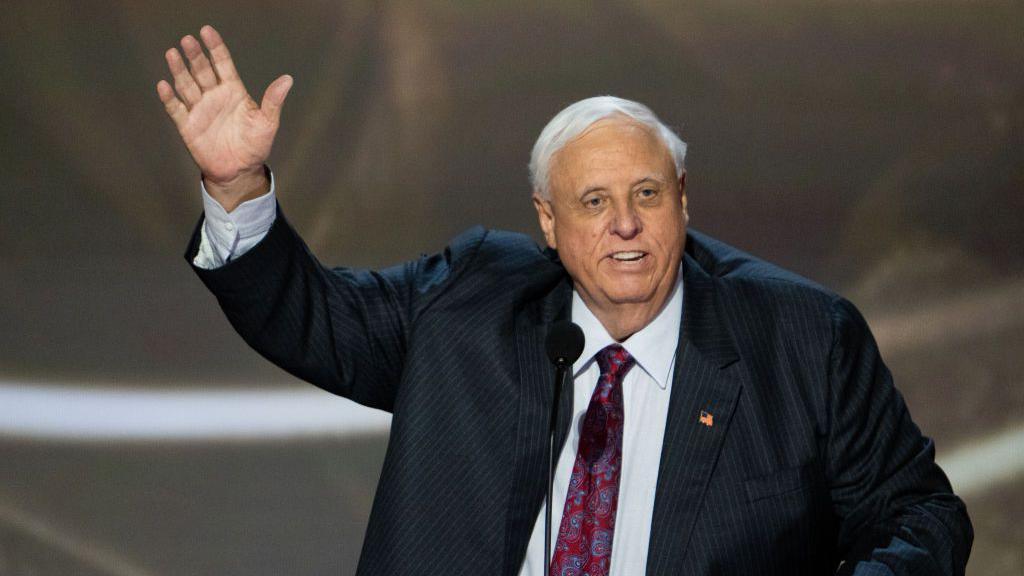Republicans retake control of US Senate

Montana Republican Tim Sheehy defeated 18-year incumbent Jon Tester
- Published
Republicans have retaken control of the US Senate, after flipping seats in West Virginia, Ohio and Montana.
The results guarantee the Republicans at least 52 out of 100 seats in the new chamber, with a handful of races still undecided.
Jim Justice, West Virginia's current governor, won the seat vacated by former Democrat Joe Manchin, while Bernie Moreno in Ohio unseated Democratic incumbent Sherrod Brown. In Montana, Democratic veteran Jon Tester lost to Republican Tim Sheehy.
In the House of Representatives, Republicans so far are leading - though results are still expected from a number of races.
If the Republican Party controls the House, Senate and the White House, it would have broad power to pass laws and enact the president's partisan agenda.
Republicans last won a majority in the Senate in 2018.
In Ohio, Brown was projected to lose to Moreno, a Colombian immigrant and former car sales magnate who portrayed the veteran politician as "too liberal for Ohio".
The contest was called the most expensive Senate race in US history.
Brown told supporters that the result was a "disappointment but not a failure", adding: "I'm not giving up on our fight for workers and I know you won't either."
The seat in West Virginia is projected to flip Republican. It was contested after the retirement of Manchin, who frequently clashed with members of his own party before turning independent.
Justice had himself been a Democrat before switching parties to the Republicans at a Trump rally in 2017.
In Montana, former Navy seal and businessman Sheehy was projected to defeat 18-year incumbent Tester, who was the last remaining Democrat holding statewide office there.
The Republican majority could yet increase further as close races in Pennsylvania, Michigan and Nevada are decided.

Jim Justice, the governor of West Virginia, won an open seat away from Democrats
A total of 34 Senate seats were being contested on Tuesday.
In Texas, Trump ally Ted Cruz fended off a robust challenge from former NFL player Colin Allred to win a third term.
Democrats launched a concerted effort to beat Cruz, but the party has not won a state-wide election in Texas for more than 30 years.
Republicans also retained Nebraska's seat for incumbent Deb Fischer, after a surprisingly fierce challenge from auto mechanic Dan Osborn, a registered independent.
The Senate result immediately kicked off discussions about who would replace Kentucky Senator Mitch McConnell as Senate Republican leader, and therefore become majority leader, in the next legislative session.
McConnell, 82, announced earlier this year that he was stepping down from the powerful role.
One possible candidate is Rick Scott, a Republican incumbent in Florida, who retained his seat despite a challenge by former Miami-area Rep Debbie Mucarsel-Powell, a Democrat who migrated from Ecuador as a child.
Speaking at a victory rally early Tuesday evening, Scott correctly predicted that Republicans would seize the majority in the Senate, adding that he would be selected as Senate majority leader.
"Florida is the centre of the Republican Party of this country," he told the crowd. "Washington can learn a hell of a lot from what we've done right here in this great state."

Lisa Blunt Rochester will represent Delaware
Democrats held a seat in Delaware, a state that President Joe Biden represented as a senator for 36 years, with a victory for fourth-term Congresswoman Lisa Blunt Rochester.
In Maryland, the Democrats retained a seat vacated by Ben Cardin, with Angela Alsobrooks beating the popular Republican Governor Larry Hogan.
They will become the first black female senators to represent their respective states.
In New Jersey, Democrats retained a seat that was vacated by Bob Menendez, who resigned after he was found guilty of accepting bribes for political favours. Andy Kim, 42, will become the first ever Korean-American senator.
In California, Rep Adam Schiff, who led the first of two impeachment investigations against Trump, retained a seat held by late Democratic Senator Dianne Feinstein.
Both parties are also vying for control of the House, although the balance of power there will not be known for several days.
The vast majority of House elections are happening in "safe districts" - regions where one party is nearly certain to win. But a handful of other races in swing districts could determine who controls Washington DC.
House races that could swing the balance are taking place a wide variety of states, with closely watched elections happening in California, New York, Washington, Maine and Alaska.



North America correspondent Anthony Zurcher makes sense of the race for the White House in his twice weekly US Election Unspun newsletter. Readers in the UK can sign up here. Those outside the UK can sign up here.